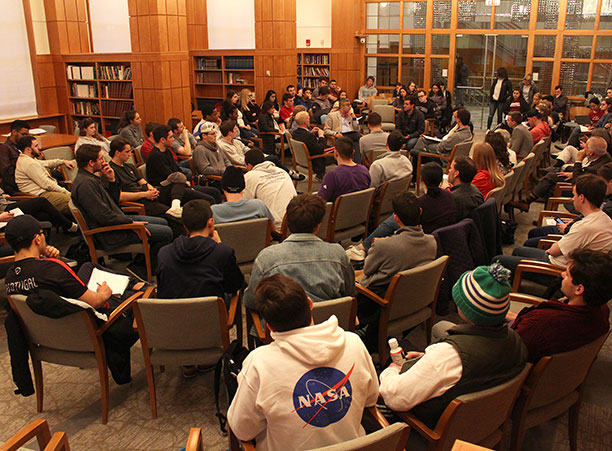
"If I'm not speaking to you as an expert on guns, then I'm speaking to you as a human being," Joseph Lawrence, professor of philosophy, said to a room full of students at the start of a conversation about the weighty, but timely, topic. "And if I speak to you as a human being, I would hope that would make it easier for you to respond to what I have to say as the human beings that you are."
Lawrence was speaking at "Guns: Transcending the Partisan Divide," one of two events sponsored by the Office of Diversity and Inclusion and the Student Government Association aimed at addressing the issue of guns, gun violence and gun control in a respectful and understanding way.
In an effort to humanize the issue and catalyze dialogue, Lawrence shared his own narrative of growing up deep within gun culture in the hills of Kentucky. "I got my first BB gun when I was five or six, graduated to a .22 rifle when I was 12, got a 410 shotgun by the time I was 14 and by the time I was 16, that went up to a 20-gauge shotgun — I shot guns a lot."
One of 15 children, Lawrence was especially close to his older brother, Allen, who died by gun suicide shortly after graduating high school.
"That," he shares, "was my introduction to philosophy. That was my introduction to the idea that you actually have to think about things seriously. That was my introduction to the idea that the world of thought is not some kind of parlor game in which people banter about their opposing ideological positions."
Based on his experiences with guns, Lawrence told students he truly believes the gun issue is one that can transcend the partisan divide.
"If you're a good democrat, you're going to be convinced that in order to feel safe in the world, the world has to do a better job of regulating guns. If you're a republican, you're going to feel equally strongly that if you want to feel safe in this world, you should have a gun so you can protect yourself against the bad guys. Both sides frame the issue solely in terms of safety. Both sides frame the issue in terms of fear."
After some opening remarks, Lawrence engaged the student in active dialogues. One student asked: "When we, in the name of fear, want to prevent dangers that we might encounter, do you think we as human beings go too far, to the point where we become ridiculous in trying to protect our lives?"
"The consensus on both sides of the political debate is, 'We just have to find the best way to stay safe,'" Lawrence replied. "From a philosophical position, you can't make the world perfectly secure. Staying alive cannot possibly be the goal of a fully human life given that each of us will die in the end. The real problem with guns is not that they do a poor job of protecting us, but that they empower us in a way that contributes to our moral corruption, making us see enemies even where there are none, making us willing at any moment to destroy another human being."
In addition to this conversation, roughly 100 students, faculty and staff also attended a fishbowl on guns that used interactive live polling to gauge personal opinions on gun-related issues.
Amit Taneja, dean for diversity, equity and inclusion, who moderated the fishbowl, said it was helpful to establish from the get-go that the vast majority of participants were interested in reducing gun-based violence.
"A shared common goal can help us understand that those with different approaches and ideas are not our enemies, but that we all wanted similar outcomes. The common goals prevent us from dismissing others without hearing them first."
"While the discussion did get tense for a short period over the perception of certain guns — namely the AR-15 — it remained a respectful atmosphere that valued open communication rather than debate," said Austin Bosworth '18, a political science major. "The biggest takeaway for me was the need for greater research on gun violence, and the way in which students recognized the connections between mental health, other forms of violence and gun deaths. It's important to have these discussions because it breaks down the 'us vs. them' mentality by humanizing the other side of the debate."
Taneja notes that he never imagined students would leave either conversation with a consensus on how to solve the issue of gun violence. Instead, he sees both events as an opportunity for deeper discernment, a foundational principle of Jesuit higher education.
"My hope is that students learn the tools necessary to engage in dialogue and reflection with others that they deeply disagree with. If we could solve the pressing problems of the world by yelling matches and debates alone, we would have world peace by now."
Transcending Partisan Lines: Students Discuss Gun Control, Rights in Multiple On-Campus Events
Through a fishbowl discussion and an open conversation with a professor of philosophy, students explored nuances of intractable social problems
Read Time
4 Minutes